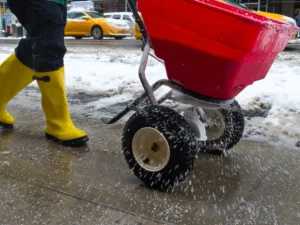Winter is the season most people have been waiting for all year to gather with family inside the warmth of their home. However, for older adults living alone, winter comes with its share of challenges. Below-zero temperatures, less daylight, and worse, winter storms make it harder for them to stay safe and comfortable at home.
The first thing you can do is equip yourself with these winter safety tips for seniors at home to ensure your loved ones can stay safe and enjoy the beauty of the winter season to the fullest.
Preparing the Home for Winter Safety
Keeping the Home Warm and Comfortable
Some days, the temperature can drop to single digits—or even below zero— until it’s felt deep in our bones. First, ensure all windows and doors in your loved ones’ house are well insulated and free from gaps that will allow freezing air to get in. Simply, using a draft blocker for the door can save you from hefty costs.
To maintain a consistently warm indoor temperature, set the thermostat to at least 68 degrees Fahrenheit (less than that can risk seniors to hypothermia) and encourage your seniors to wear sweaters, socks, and slippers to help retain body heat. For those extra-cold days, consider providing electric blankets or a space heater for additional warmth.
Preventing Indoor Hazards
With fewer daylight hours in winter, seniors are more vulnerable to falls. Remove all those loose rugs or secure them with non-slip pads to minimize the risk. Clear walkways of clutter, such as cords, shoes, or small furniture, to provide unobstructed paths. In high-risk areas like bathrooms, installing grab bars can offer added support and make navigation safer.
Though heating devices bring warmth and comfort to the space, they also pose a risk of fire. Make sure you place space heaters on a flat, non-flammable surface and keep them at least three feet away from curtains or furniture. Moreover, all appliances should be checked for frayed cords or faulty connections to avoid more harmful risks.
Reducing Outdoor Winter Risks
Preventing Falls on Ice and Snow

Due to gloomy weather seniors’ moods are also at risk of being gloomy. While still prioritizing winter safety for seniors, you must encourage your loved ones to step outside their homes for fresh air and sunlight that can help them beat the winter blues.
To reduce the risk of falls on slippery ice and snow, ensure that all paths and driveways are cleared, and use salt or sand to improve traction. Also, remind them to bundle up in warm layers and proper protection such as gloves, scarves, and hats, wear sturdy, non-slip footwear designed for winter, and use assistive devices like a cane with an ice-grip attachment.
Before heading out, always check the weather forecast to avoid icy or stormy conditions. Better yet, ask a professional caregiver like Sunny Days In-Home Care to accompany your loved ones so they can venture outdoors safely and comfortably.
Safe Transportation for Seniors
Transportation can be tricky during winter, but following the tips of winter safety for seniors, their trips to appointments, errands, or visiting loved ones can remain safe and comfortable. Whether your loved one is driving or being driven, the vehicle must be winter-ready. Check tires for proper tread and inflation, make sure brakes are in good condition, and confirm that windshield wipers and defrosters are functioning properly.
Also, always remember these simple tips: keep the gas tank at least half full to prevent freezing, and stock the car with winter essentials such as an ice scraper, snow brush, blankets, flashlight, water, and non-perishable snacks for emergencies.
Maintaining Health and Wellness During Winter
Staying Warm
It’s no surprise that seniors’ body response to cold may not be the same as it used to be when they were younger. Therefore, the National Institute on Aging (NIA) recommends that every older adult wear several layers of clothes when it’s cold to trap warm air and wear winter accessories like hats, scarves, and gloves when going outdoors. Even when simply lounging indoors, socks, slippers, hats, and blankets are a must!
Eating nutritious foods and staying hydrated

Maintaining proper nutrition and hydration is especially important to ensure winter safety for seniors. Even if they can’t digest hard food properly, nutrient-rich soft foods can provide them with the nutrients they need to keep warm. Go with warm, hearty meals like stews made with soft vegetables, beans, and meat. Since sunlight exposure will be limited, include foods rich in vitamin D, like salmon, fortified cereals, and many more.
Beware: Cold weather may suppress thirst when, in fact, hydration is as important as it is in summer. So, remind your beloved seniors to drink plenty of water throughout the day and offer warm beverages like herbal teas or decaffeinated coffee to make hydration more appealing. Food with a high water content, like soup, can also be a perfect alternative to boost fluid daily intake.
Managing Winter Illness Risks
Simple steps can help prevent winter illnesses like colds and flu that can be serious for seniors. First is, obviously, staying warm, as the cold temperature can weaken the immune system. To double the protection, encourage them to eat immune-boosting food like citrus foods and spinach and stay active with some light indoor exercise. On top of all that, shield their body with COVID-19, flu, and RSV vaccines as recommended by the CDC.
Emergency Preparedness for Winter Weather
Stocking Up on Essentials
Snowstorms and icy conditions can make it harder to access supplies, while power outages can leave seniors vulnerable. Should those unwanted emergencies occur, you want them to have flashlights, batteries, blankets, and a fully charged phone or backup power bank in hand. Other must-haves include supplies of non-perishable food, bottled water, and medications that can help them get through those tough times.
Creating an Emergency Contact Plan
List emergency contacts, from local emergency services to family, caregivers, and neighbors, and put them somewhere easily accessible so your loved ones can quickly reach help when they need it the most. Moreover, establish regular check-ins in person or through video calls if you’re doing lost-distance caregiving. That way, you can have peace of mind knowing your loved ones are okay from time to time.

End Note
Winter comes with challenges for seniors, but with tips on winter safety for seniors, like preparing the home, reducing outdoor risks, maintaining health and wellness, and preparing for winter emergencies, your loved ones can stay safe and comfortable even during the coldest day of winter. At Sunny Days In-Home Care, we’re here to provide expert care and peace of mind for seniors and their families. From assisting with daily tasks to safely accompanying your loved ones outdoors, we’re committed to making winter as worry-free as possible.
Contact us to learn how we can help you or your loved one stay safe, comfortable, and cared for this winter.

